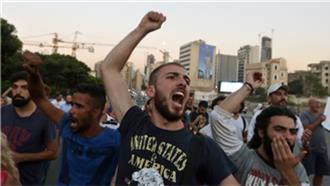Al Jazeera –

Despite a deadly sandstorm blanketing the country, thousands of people are planning to protest in Lebanon’s capital Beirut, the latest demonstration in a campaign against government’s failure to provide basic services like rubbish collection.
The protests on Wednesday will coincide with a dialogue session by political leaders to tackle the issues that have led to months of political deadlock.
In an attempt by authorities to prevent clashes with the protesters, Beirut’s centre was completely blocked off with barbed wire and metal barriers on Wednesday morning.
Hundreds of security personnel gathered to prevent any entry into the downtown area.
Demonstrators are expected to gather in Beirut’s Martyrs Square.
Activists from the different civil society movements behind the protests have told Al Jazeera that "many surprises" will happen before the mass rally, expected to start on Wednesday evening.
Assaad Thebian, one of the main activists behind the You Stink! campaign told Al Jazeera the purpose behind the protests is to "put pressure on the people around the dialogue table so they take into consideration our demands".
Protests gathering momentum
Dozens of parliamentary officials from opposing political factions will be meeting at midday local time to search for an agreement on issues, which include finding a new president, the electoral draft law, cabinet mechanisms, and citizenship for expatriate Lebanese.
Civil society activists have been holding popular protests for several weeks now, demonstrating against the political class and corruption within the system.
The protests were triggered by a rubbish crisis that started in July, after the main landfill for Beirut and Mount Lebanon was shut down and thousands of tonnes of rubbish were left rotting on the streets.
READ MORE: Lebanon dialogue ‘a move to stifle protest momentum’
Gathering momentum, the protests were able to attract tens of thousands of people as residents called for the resignation of the environment minister for failing to handle the crisis appropriately.
Security forces have previously used tear gas, water cannons, live rounds and rubber bullets against the demonstrators, leaving hundreds injured.
The protests and the dialogue session are being held as Lebanon faces one of the worst sandstorms in its history, with many killed and hundreds injured since the storm hit the country on Monday.



